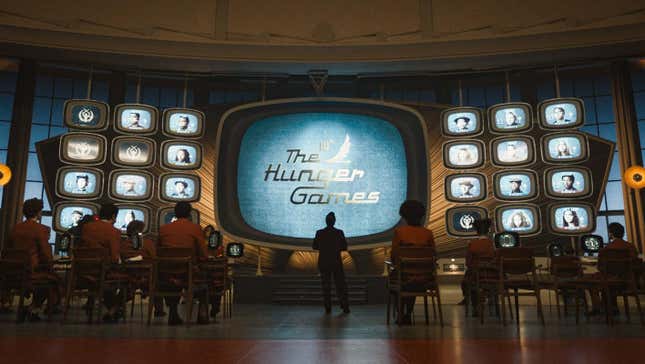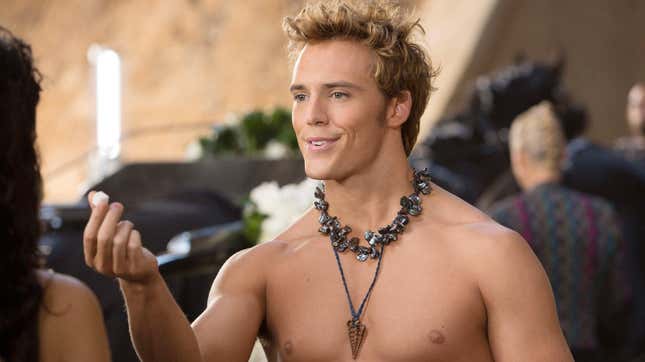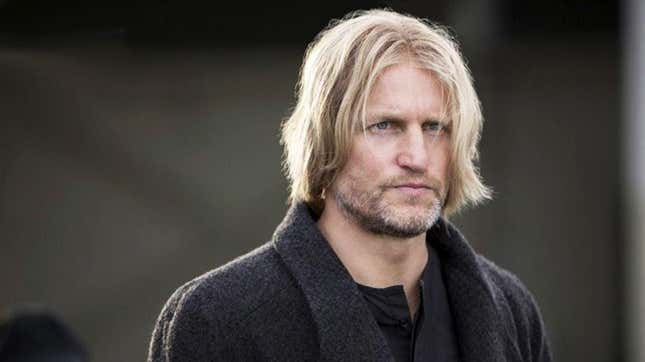
With the release of The Hunger Games: The Ballad Of Songbirds And Snakes, Lionsgate has used up the last of the source material that fed one of its most popular IPs. The Hunger Games book trilogy by Suzanne Collins yielded a series of four successful films, ending in 2015 with The Hunger Games: Mockingjay — Part 2. The latest installment, a prequel set 64 years before the trilogy begins, gives us the backstory of Coriolanus Snow and some insight into what drives him to commit such cruel acts when he becomes president later in life.
But what happens next? There’s a lot of ground to cover if the franchise were to continue. Whether or not Collins has any more Hunger Games books in her, it’s conceivable that she could still be involved, either by writing or contributing ideas to a new script set in a different time period or continuing the story from where it ends in the fourth film. Here are some ideas that could be explored if the studio wants to keep giving us stories set in the world of Panem.
Finnick Odair’s games
When asked about whether he would be willing to come back for additional installments featuring other characters, specifically Finnick Odair and Haymitch Abernathy (we’ll get to him in a bit), Songbirds And Snakes director Francis Lawrence told Entertainment Weekly that he’d only be interested if Collins continued to be involved. “If Suzanne has another thematic idea that she feels fits into the world of Panem—whether that’s with new people [or] familiar characters [like] Finnick, Haymitch, whoever—I’d be really interested in looking at it and being a part of it,” Lawrence said.

Finnick appears in Catching Fire as the male tribute from District 4. Since it’s the 75th anniversary of the games, known as the “Quarter Quell,” the Capital has changed the rules so that only former victors can be reaped as tributes in the games. Finnick is one such victor. We don’t know much about the games he won at the age of 14, except that he used a net and a trident as his weapons, an advantage coming from a district that specializes in fishing. After he won he was kept in the Capital and prostituted out to its wealthy residents. This gave him a political advantage in learning secrets from his clients, but also further radicalized him against the government. Portrayed by Sam Claflin in the film adaptation, he’s a fan-favorite character, so it wouldn’t be hard to generate interest in his story.
Haymitch Abernathy’s games
When we meet Haymitch Abernathy (played by Woody Harrelson in the films) in The Hunger Games, he’s the only victor to ever come from District 12. And since all the new tributes must work with a mentor from their district who was a previous victor, he’s the only one who qualifies. Years of having to watch his tributes compete and die in the arena has turned him into a bitter alcoholic with a rebellious streak. But he wasn’t always that way. He won the 50th Hunger Games through sheer ingenuity, using the force field that surrounded the arena to his advantage to take out his last competitor. Or so we’re told. We may know how those games ultimately turned out, but there’s plenty of story to fill in during the games, and the 24 years that came after. We wouldn’t mind spending more time with Haymitch in a future film.

A closer look at the Careers
In certain districts of Panem, primarily the wealthier ones, it’s customary to train select children from birth to compete in the games as volunteers, thus saving the rest of the residents from wondering if their child will be chosen at random. They’re called career tributes, or Careers, because their only goal in life is to fight in the games. The ones we’ve met so far have been vicious hunters who tend to run in packs, but the concept could be interesting to explore from the point of view of someone raised in that environment. What is their life like before they are called to join the games? Are they chosen because of their naturally fierce temperament, or are they forged into human weapons by their handlers? It would be a chance to further explore the theme of nature versus nurture introduced in the books and movies.
Gamemaker Snow
At the end of The Ballad Of Songbirds And Snakes, Coriolanus Snow becomes an apprentice to Head Gamemaker Dr. Volumnia Gaul (played by Viola Davis). From there, we can presume, he begins his rise up the ranks until he eventually becomes President Snow. Yet we only see the earliest stages of his transformation from an ambitious academy student to the iron-fisted authoritarian he will later become. The 10th Hunger Games ushers in some new features—like the mentors, a full-time TV host, betting on the tributes, and allowing viewers to send gifts into the arena—that will transform the event into the epic spectacle it is by the time Katniss volunteers to take her sister’s place at the reaping 64 years later. What horrors do Coriolanus and Dr. Gaul come up with when they put their minds together?

Looking into the future
Additional Hunger Games sequels don’t have to spend all their time in the past. The story could continue where Mockingjay left off. The victory of the rebels means no more Hunger Games, but Katniss and Peeta will never be able to truly escape them. The book ends 20 years later, with Katniss worrying about how she’s going to explain to her children what she and their father did in the games. Those kids could become the main characters of their own stories if Collins had more to say about situational morality, social inequality, and the self-perpetuating cycle of war and destruction. Those themes haven’t become any less relevant in the 15 years since the original book was published.